

How To Answer Ten Common Interview Questions. 36 Interview Questions That Are Actually Fun To Answer. Job interviews are exciting and anxiety-inducing at the very same time: Landing one means you’ve made it past the initial application stage and into the more exclusive “yes” pile, but it also means preparing for those all-too-familiar questions about your strengths, your weaknesses—yeah, you know the drill.
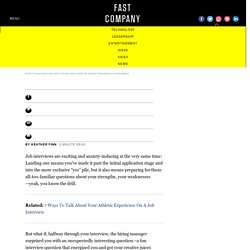
Executive Interviews: How to Stand Out. “Your job at the interview is to be as helpful as you can,” said Claudio Fernandez-Araoz, a seasoned search consultant and author of Great People Decisions.
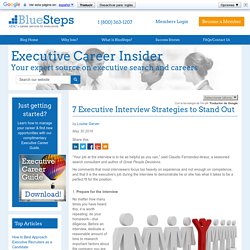
He comments that most interviewers focus too heavily on experience and not enough on competence, and that it is the executive’s job during the interview to demonstrate he or she has what it takes to be a perfect fit for the position. 1. Prepare for the interview No matter how many times you have heard this, it is worth repeating: do your homework—due diligence. Before an interview, dedicate a reasonable amount of time to research important factors about the company you are interviewing with, such as industry trends, company culture, products, highs and lows of company history, etc. 2. Not only are stories memorable, but people generally have a higher level of engagement when information is relayed in story fashion. 3. 9 Most Common Behavioral Interview Questions and Answers.
Five Good Answers To The Question 'What's Your Greatest Weakness?' Three Habits Of The Best Job Candidates I’ve Ever Interviewed. Tell me if this sounds familiar: You continually make it to the interview stage, and then—crickets.
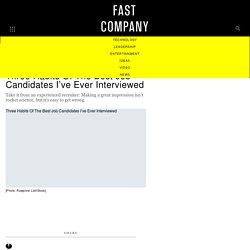
You have the skills to get in the door, but for some reason, you stall out when it comes to getting the offer. 3 Rarely-Asked Interview Questions Every Job Seeker Should Ask. A typical interview goes something like this: The prospective employer grills you with 45 minutes of behaviorally-based interview questions--sometimes in a three-person panel (and if they're not, they're probably doing it wrong).
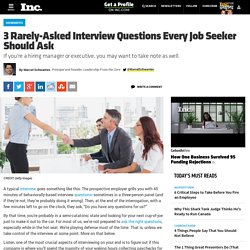
Then, at the end of the interrogation, with a few minutes left to go on the clock, they ask, "Do you have any questions for us? " By that time, you're probably in a semi-catatonic state and looking for your next cup-of-joe just to make it out to the car. For most of us, we're not prepared to ask the right questions, especially while in the hot seat. We're playing defense most of the time. That is, unless we take control of the interview at some point. Listen, one of the most crucial aspects of interviewing on your end is to figure out if this company is where you'll spend the majority of your waking hours collecting paychecks for the next 2-5 years.
10 Common Excuses That Silently Damage Managers' Careers. Three New Killer Interview Questions. 13 of the hardest questions you have to answer at Tesla. Here's how to answer 5 job interview questions that are designed to trick you. The 2 Questions You Need to Ask in Every Job Interview. When top CEOs and entrepreneurs are asked for their all-time favorite job interview questions, you get a list of entertaining but wildly different answers like: "What would you do in the event of a zombie apocalypse?
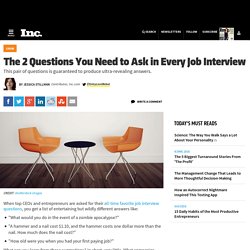
""A hammer and a nail cost $1.10, and the hammer costs one dollar more than the nail. 5 Interview Mistakes You're Still Making In 2016. I’ve interviewed many candidates in my career.
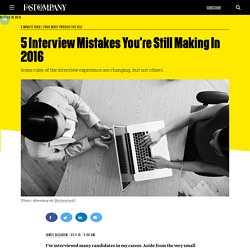
Aside from the very small number who do strange and sometimes mind-blowing things, most are professional and make an attempt to present their best selves. But as companies ease up on the formalities, one candidate's sense of interview etiquette might look pretty different from another's. It can be hard to know which pieces of received wisdom to hold onto and which to discard in the interest of authenticity. While every company is different, here's a look at five of the most common interview mistakes job seekers are still making—either by discarding conventions they shouldn't or just making the wrong moves altogether. 1. Collaboration is more critical than ever. Actually, no. Fortune. Ask senior executives in New York, Los Angeles, Palo Alto, Seattle, Shanghai, Beijing or London what their biggest concern is and they will all tell you the same thing.
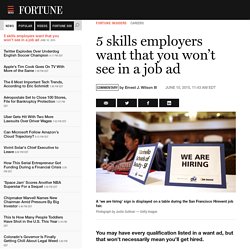
It’s not capital, technology, regulatory changes or economic uncertainty. It’s talent. And not just talent generally, but talent possessing some specific soft skills beyond conventional business and engineering training. That was the answer leaders and key faculty from the Annenberg School of Communication and Journalism at the University of Southern California heard during three years of research, including in-depth interviews with C-Suite and senior executives from a broad range of industries and from Fortune 50 companies to start-ups. That soft skills are in short supply isn’t news. From further research, including extensive surveys, follow-up interviews and analyses of a Korn-Ferry data base of 1,887 executives, five essential talents that companies need emerged:
31 Most Common Interview Questions and Answers. 11 Interview Questions That Identify "A-Players" If you’re in the fortunate position of having many qualified applicants, ask some of these out-of-the-box questions.
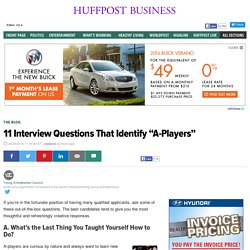
The best candidates tend to give you the most thoughtful and refreshingly creative responses. A. What’s the Last Thing You Taught Yourself How to Do? A-players are curious by nature and always want to learn new things. At a startup, this is one of the most valuable skills any employee can have. A. Everyone makes mistakes. What the most impressive job candidates all have in common. 7 Interview Questions For Measuring Emotional Intelligence.
Emotional intelligence involves self-awareness, self-regulation, motivation, empathy, and social skills.
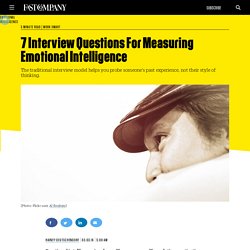
In other words, it's a complicated amalgam that hiring managers have a hard time testing for. As a result, many fall back on gut instincts and subjective impressions. It isn't always a smart move to leave something so important to such faulty measures. When a candidate has these qualities, they can work well with others and lead change effectively, so it's no wonder why organizations are placing a higher priority on emotional intelligence. And fortunately, even the traditional interview format can be retooled to test for it.
Just about every smart interview candidate has figured out how to appear highly emotionally intelligent, whether or not they actually are. 1. Fastcompany. The right way to answer questions about what makes you unique or special is not to badmouth the competition.
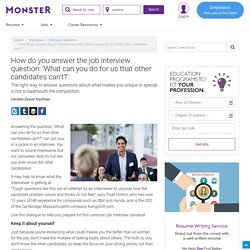
Answering the question, “What can you do for us that other candidates can’t?” Can put you in a pickle in an interview. You want to sound impressive, but not conceited. How to Avoid Hiring a Toxic Employee. The Questions Managers Want You to Ask During a Job Interview. It's a query that can give an ill-prepared job seeker pause: So, do you have any questions for me? Interviewers will judge you by your questions. Almost all employers wrap up job interviews by turning the tables and offering candidates an opportunity to showcase how well they understand the role, how interested they are in the opportunity and what plays to their passions points. When the time comes to flip roles and grill your interviewer about the potential job, it can be tempting to ask pressing questions about salaries, hours and workload.
But asking questions about vacation time, salary reviews and benefits might be red flags — and worst-case scenario, they might cost you the job. When asking your interviewer questions regarding compensation or scheduling, there’s an imminent risk of being perceived as self-serving. Uk.businessinsider. The One Thing to Say When Asked Your Current Salary in a Job Interview. Absurdly Driven looks at the world of business with a skeptical eye and a firmly rooted tongue in cheek. It's a question you should always be prepared for. The Only Interview Question That Matters. Last week, LinkedIn announced to the world that I've been in the recruiting industry for 36 years. During that time, I've written a number of books about talent challenges and opportunities, but one thing continues to surprise me: More than 90 percent of hiring managers think they're good interviewers, yet rarely do they reach unanimous hiring decisions with other 90 percenters in the same room evaluating the same candidate.
4 Terrible Questions Job Interviewers Should Never Ask Again. How To Answer 'Why Did You Leave Your Last Job?' Best Job Interview Questions. Faced with one pointed question after the next regarding your career, a job interview can quickly take on the feel of an interrogation. But employers aren't the only ones who get to poke and pry during the sit-down. At some point, job candidates can make inquiries that flesh out everything from expectations to why their prospective boss enjoys working for the company.
By asking thought-provoking questions, you can not only collect valuable information but also distinguish yourself from the pack.
Common Interview Questions. 1. Discuss your resume.First and foremost, be prepared! How to Answer the Question "Tell Me About Yourself" Hitting the Interview Home Run: Great Interview Responses. 14 Revealing Interview Questions. Interview questions: Everyone has them. And everyone wishes they had better ones. So I asked smart people from a variety of fields for their favorite interview question and, more importantly, why it's their favorite and what it tells them about the candidate. 1.
Interview Questions That Expose Exceptional Performance. In my last column, I detailed the one question that reveals everything a hiring manager needs to know to evaluate a candidate. The idea here is that getting a detailed, thoughtful answer to just this one question should represent the bulk of your interviewing time and effort. Job Interviews: 5 Questions Great Candidates Ask. The 3 Questions People Always Forget to Ask in an Interview. The One Job Interview Question to Get Right. 11 Interview Questions You Wouldn't Think to Ask.
Everyone wants to make better hiring decisions. Most people focus on how well candidates perform in the interview: In theory, if you ask the right questions, you'll get answers that will give you insight into what the candidates really bring to the table. The following companies use questions that aren't exactly the standard, "where do you see yourself in 5 years? " question, but they swear they work. The explanations below the questions comes from the businesses. Read through them and then tell me what you think and what works in your business--either in the comments or by sending me an email at EvilHRLady@gmail.com.